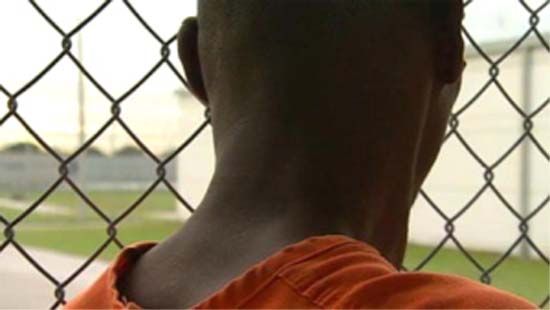
Inmate from the documentary “The House I Live In”
The War on Drugs, a label we inherited from Richard Nixon, is a lie. It is simply a war on people, and has had the most dire effect on people of color, whether inside the borders of the U.S, or as a part of destabilizing military interventions in other countries.
If you have not yet watched the documentary film The House I Live In, it is a must see. It was the winner of the 2012 Sundance Film Festival Grand Jury Prize-Documentary.
Eugene Jarecki’s seminal film Why We Fight dissected the underbelly of the American war machine. Now, with scalpel-like precision, Jarecki turns his lens on a less visible war-one that is costing more lives, destroying more families, and quickly becoming a scourge on the soul of American society. In the past 40 years, the War on Drugs has accounted for 45 million arrests, made America the world’s largest jailer, and destroyed impoverished communities at home and abroad. Yet drugs are cheaper, purer, and more available today than ever. Where did we go wrong, and what can be done?
Clearly no one film, or even series of films, can cover the depredations of the drug war, nor all of the history, and current multi-varied facets, but this is a good starting point for raising some of the issues.
It is impossible to write one comprehensive piece delineating all of the aspects of this war which include:
Incarceration
Criminalization
Decriminalization
Unequal sentencing
Legalization
Public Heath (including HIV/AIDS and Hep C)
Drug Treatment
Harm reduction (including syringe exchange and safe injection spaces)
Moral/religious stigma surrounding drug use
Racism and white privilege
Use of police and the military, including US interventions
Drug trafficking
Agriculture (including hemp, coca and opium poppy cultivation)
Economic impact, costs
Money laundering, Wall Street
Crime
Gun control and gangs
Elected officials and elections-“tough on crime”
My own perspective for over 25 years has been primarily one from a medical anthropology focus-looking at the topic of drugs as a public health concern.
I have spent time working with injection drug users in the streets and shooting galleries of New York and Puerto Rico. I’ve also worked with crack smokers, and women and men who barter sex for drugs or money to get them.
In the past as a community activist I worked with local organizations to address the drugs flooding our communities-first heroin, then crack, and with new methods of treatment including acupuncture.
As part of the process of my own political education, I learned to make connections to government participation in drug trafficking along with that of local police agencies.
I will never forget the first time I read, The politics of heroin in Southeast Asia by Alfred W McCoy, back in the early 70s. His opus has been updated in 2003-The Politics of Heroin: CIA Complicity in the Global Drug Trade-to include new chapters detailing “U.S. involvement in the narcotics trade in Afghanistan and Pakistan before and after the fall of the Taliban, and how U.S. drug policy in Central America and Colombia has increased the global supply of illicit drugs.”
In December of 2012, Sundog Pictures released its documentary on the war on drugs, Breaking The Taboo, to YouTube:
Narrated by Oscar winning actor Morgan Freeman, “Breaking the Taboo” is produced by Sam Branson’s indie Sundog Pictures and Brazilian co-production partner Spray Filmes and was directed by Cosmo Feilding Mellen and Fernando Grostein Andrade. Featuring interviews with several current or former presidents from around the world, such as Bill Clinton and Jimmy Carter, the film follows The Global Commission on Drug Policy on a mission to break the political taboo over the United States led War on Drugs and expose what it calls the biggest failure of global policy in the last 40 years.
My personal perspective is one viewed from real life family relationships to those who have defined themselves as addicts and/or low level dealers, including my own substance use in the past.
Important to me these days is supporting efforts around legalization, but to also warn progressives that focusing simply on marijuana will not significantly change the lives of those who do more than smoke or deal a little weed, or who have a need for medical usage.
Many people I’ve had conversations with who support legalization or decriminalization of cannibis are still locked into moral judgmental mindsets about those who either use or sell what they view as “hard drugs.” I concur with plf515, who has worked as a data analyst on drug intervention projects, who said recently, “No one should go to jail for putting something into his/her own body.” His suggestion included checking out the Drug Policy Alliance.
They have a comprehensive collection of data on all of the aspects of the issue, as well as steps for direct action.
In the months ahead I’ll be exploring all of the facets of the failed War on Drugs, how we can fight to end it, and reduce harm.
I hope you will join me.
cross-posted from Daily Kos
29 comments